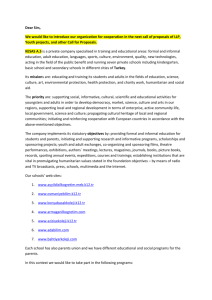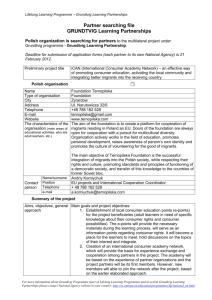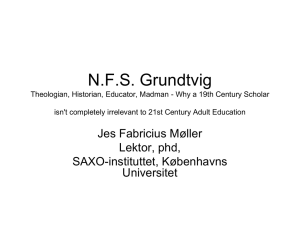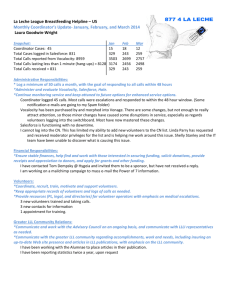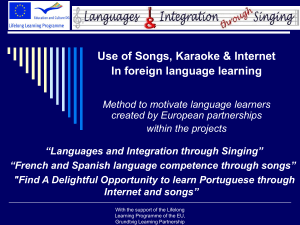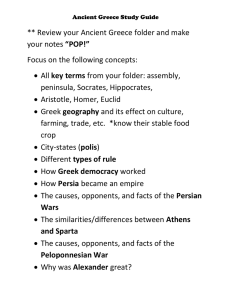General framework of LLL provision in Greece.
advertisement
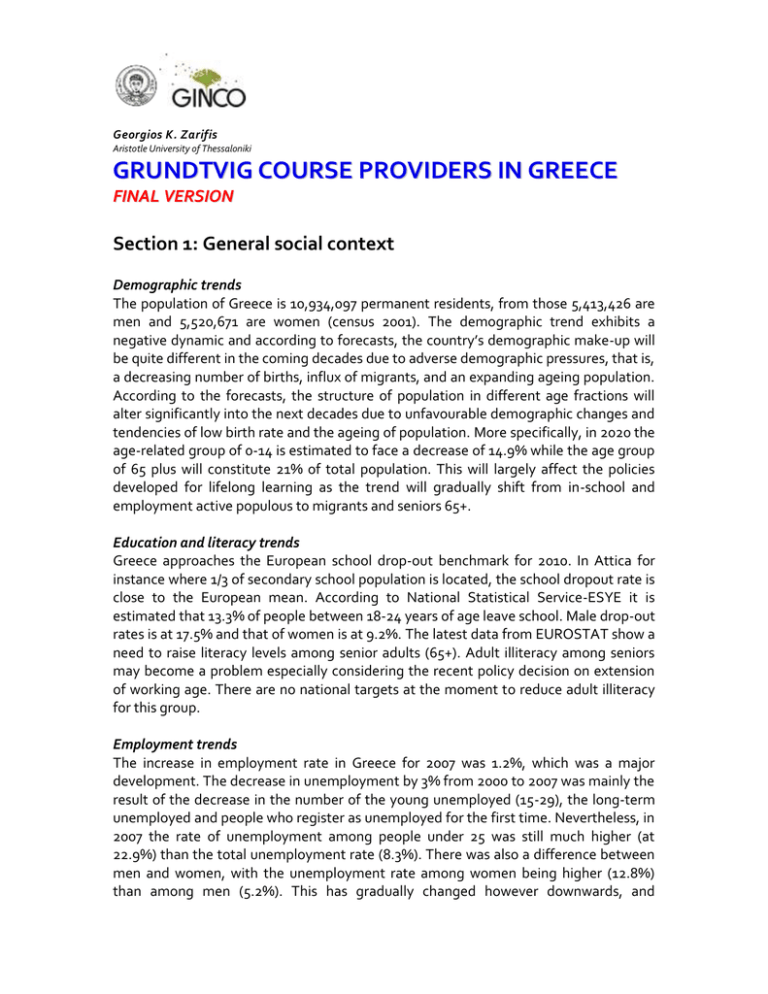
Georgios K. Zarifis Aristotle University of Thessaloniki GRUNDTVIG COURSE PROVIDERS IN GREECE FINAL VERSION Section 1: General social context Demographic trends The population of Greece is 10,934,097 permanent residents, from those 5,413,426 are men and 5,520,671 are women (census 2001). The demographic trend exhibits a negative dynamic and according to forecasts, the country’s demographic make-up will be quite different in the coming decades due to adverse demographic pressures, that is, a decreasing number of births, influx of migrants, and an expanding ageing population. According to the forecasts, the structure of population in different age fractions will alter significantly into the next decades due to unfavourable demographic changes and tendencies of low birth rate and the ageing of population. More specifically, in 2020 the age-related group of 0-14 is estimated to face a decrease of 14.9% while the age group of 65 plus will constitute 21% of total population. This will largely affect the policies developed for lifelong learning as the trend will gradually shift from in-school and employment active populous to migrants and seniors 65+. Education and literacy trends Greece approaches the European school drop-out benchmark for 2010. In Attica for instance where 1/3 of secondary school population is located, the school dropout rate is close to the European mean. According to National Statistical Service-ESYE it is estimated that 13.3% of people between 18-24 years of age leave school. Male drop-out rates is at 17.5% and that of women is at 9.2%. The latest data from EUROSTAT show a need to raise literacy levels among senior adults (65+). Adult illiteracy among seniors may become a problem especially considering the recent policy decision on extension of working age. There are no national targets at the moment to reduce adult illiteracy for this group. Employment trends The increase in employment rate in Greece for 2007 was 1.2%, which was a major development. The decrease in unemployment by 3% from 2000 to 2007 was mainly the result of the decrease in the number of the young unemployed (15-29), the long-term unemployed and people who register as unemployed for the first time. Nevertheless, in 2007 the rate of unemployment among people under 25 was still much higher (at 22.9%) than the total unemployment rate (8.3%). There was also a difference between men and women, with the unemployment rate among women being higher (12.8%) than among men (5.2%). This has gradually changed however downwards, and considering the current economic trend in Greece it will escalate even further down. According to OECD (2010) youth are among the most disadvantaged groups in the Greek labour market, despite recent improvements. The youth (aged 15-24 years) unemployment rate stood at 25.3% in the 3rd quarter of 2009, far exceeding the OECD average, and is expected to rise further in 2010. A gap vis-á-vis the OECD counterparts also exists in terms of access to employment, length of the unemployment spell and the duration of transition from school to work and pay. The poor labour market outcomes of Greek youth may be partly explained by the combination of relatively high minimum wages, taxes on labour and dismissal costs that discourage employers from hiring inexperienced youth. Moreover, unemployment benefit is not subject to mutualobligations, and job-search support is limited. According to the OECD Employment Outlook, total poverty in Greece is 13%, or 2 percentage points higher than the OECD average and the second highest in the EU. Unemployment is a key driver of poverty and 25% of jobless households in Greece are poor. Although this is a high number, it is well below the OECD average and in-work poverty appears to be an even more important challenge for Greece. Nine per cent of individuals living in households with at least one worker are poor, which is 2 percentage points higher than the OECD average. Groups with the highest risk of poverty include workers in temporary contracts and part-time jobs. Importantly, households with children fare worse than their childless counterparts with comparable employment status. The aim of training is to modify or complete job seekers’ skills so that they would better respond to the labour market needs, and therefore, to contribute to finding a job or to the increase in the income of the employed. According to EUROSTAT (December 2009), unemployment rates have risen to 10.2% in relation to 9.4% in the EU average for the same month, while employment rates in 2008 have also risen to 61.9% in relation to 65.9% in the EU average. This shows that a rising demand for policies to address the issue of skills updating for the unemployed (especially women) will soon emerge. Adult education policy framework Things seem to be moving very slowly or occasionally not seem to be moving at all. The reasons for this setback or delay are various and not only related to the economy in terms of lack of substantial funding. Largely the existence of two different Ministries (Ministry of Education and Ministry of Employment) that overlap in their responsibilities and actions has caused a great delay in the implementation of the Action Plan. Table 1 Percentage of the adult population aged 25 to 64 participating in education and training European Union (27 countries) 1997 1998 1999 2000 2001 2002 2003 2004 2005 2006 2007 2008 : : : 7,1 7,1 7,2 8,5 9,3 9,8 9,7 9,5 9,5 1,3 1 1,2 1,1 2,6 1,8 1,9 1,9 2,1 2,9 0,9 1 Greece Source: EUROSTAT. Last update: 19.11.2009 Date of extraction: 18 Apr 2011 01:23:19 MEST Hyperlink to the table: http://epp.eurostat.ec.europa.eu/tgm/table.do?tab=table&init=1&plugin=0&language=en&pcode=tsiem080 Furthermore, the Action Plan was used more as an inspiration rather than a tool for endorsing certain policies. This is largely because of the fact that lifelong learning is seen more as a general trend in Greece, a European drift, than a domestic social need. Developments however are on the way at this very moment. According to the Ministry of Education, Lifelong Learning and Religious Affairs in February 2010 the Greek Government, opened a public deliberation process with the aim to get the public’s views towards a new national LLL strategy. This deliberation process was based on a document produced by the Minister of Education which outlined the views of the Government about the current situation regarding LLL in Greece and introduced the basic tenets of the Government’s strategy. In this policy document the situation of Greece regarding the LLL indicator on adult participation in E&T as compared to the EU benchmark (Greece: 2,9%, EU average: 9,5%, 2010 target: 12%), is characterised as “grave”. The new Government also noticed that since 2004 no progress was made towards the development of a National Qualifications Framework (NQF) linked to the European Qualifications Framework (EQF). Table 2 General framework of LLL provision in Greece. The overall Government policy on LLL is envisaged to support the creation of a National Network of LLL. The operation of such a network requires the active contributions of social partners, something which will ensure the effectiveness of continuing vocational education and training and the link of E&T to real labour market needs. Towards the creation of a National Network of LLL social partners and citizens are called to contribute at all phases, from its design to its evaluation. This effort will be accompanied by a reform of the National System for Linking Vocational Education and Training with Employment (ESSEEKA). The basic orientation of the National Network of LLL is to tackle the problems of E&T dead-ends by linking formal, non-formal and informal E&T. It will enhance the flexibility of the E&T paths for the individuals through transparency and inter-connectedness between types of E&T. Finally, it will focus on learning outcomes within an integrated national framework of evaluation and certification of skills independently of the ways they were developed. The goals of the National Network of LLL are the following: The development of an integrated national framework of evaluation and certification of adult E&T services and activities. The development of an integrated national framework for the recognition of skills and certification of knowledge, skills and capacities. Systematisation of identification of labour market needs and the professional & training needs of citizens at national and regional level. The lowering of the barriers faced by vulnerable groups to participate in LLL. Ensuring that all citizens have access to E&T. Continuous training of adult trainers. Figure 1 Approval and implementation of LLL activities in Greece 2003-2007 in millions of euros. Source: General Secretariat for Lifelong Learning, 2008. Adult education legal framework Until recently all LLL activities were legitimated through the seminal Law 3369/2005 on 'Systematisation of Lifelong Learning and Other Regulations'. This Law was intended to establish an integrated legal framework for more efficient co-ordination and systemization of the Lifelong Education and Training actions and bodies. All recent developments however will refer from now on to the legal framework for LLL that is included in the new Law 3879/2010. Other basic legislation regulating education affairs that has affected or is affecting adult education is as follows: Law 2983/92, Article 27 ‘Hellenic Open University – HOU’. Law 2327/1995 stipulates the establishment of the Institute for Continuing and Adult Education (ΙΔΕΚΕ/IDEKE). Law 2525/1997 establishes Second Chance Schools (SDE) attended by adults who have not completed compulsory education and who are granted a qualification equivalent to the one obtained after successful completion of Lower secondary (or primary) Education. Ministerial Decision Nr 115911/9-10-2000, Official Journal 1263/Β/18-10-2000 (Trainers Registry – ΕΚΕΠΙΣ/EKEPIS). Law 3191/2003 stipulates the establishment of the National System for Linking Vocational Education and Training with Employment (ΕΣΣΕΕΚΑ/ESSEEKA). The Law 3577/2007 defines the decision-making bodies with regards to technical and developmental works implemented by GSLL. Table 3 Total funding of LLL activities in Greece 2000-2007 in millions of euros. Source: General Secretariat for Lifelong Learning, 2008. Adult education structural framework Under the supervision of the Ministry of Education, Lifelong Learning and Religious Affairs (ΥΠΔΜΘ/YPEPTH) and the General Secretariat for Lifelong Learning (ΓΓΔΜ/GSLL), a Legal Entity of Private Law was set up in 1995 with the title “Institute for Continuing and Adult Education” (ΙΔΕΚΕ/IDEKE) the purpose of which is to study, conduct research, provide information and develop activities on matters concerning adult learning. The General Secretariat for Lifelong Learning (ΓΓΔΜ/GSLL) through the Institute for Continuing and Adult Education (ΙΔΕΚΕ/IDEKE) supervises the following structures and the implementation of the relative programmes: Second Chance Schools (ΣΔΕ/SCS) The Ministry of Education has assigned IDEKE to establish Second Chance Schools (58 all around the country) to offer special categories of young and older adults another opportunity to enter the labour market. This institution concerns people above 18 years old, who have not completed the nine-year compulsory education, and are therefore at risk of social exclusion and marginalisation. Curricula are particularly flexible, so that they respond to the young people’s individual needs. Emphasis is given to the acquisition of basic qualifications and the development of personal skills. Adult Education Centres (KEE/AEC) A large amount of the above programmes are offered through the Adult Education Centres (58 all around the country). KEE is a project that has been developed by the state and aims to provide basic and new basic skills at a local level by creating a network of centres in all prefectures all around the country. KEE operates under the auspices and is monitored by IDEKE which is responsible for the administration, funding and dissemination of the project. It is addressed to everyone who is interested in a basic skills’ course or ICT as well as a variety other social activities. It is supported by public law and the local authorities and is co-financed by the European social fund and the Greek State. Its aims are to promote Lifelong Learning for all through the provision of programmes that are of an emancipatory character and are also accessible to all regardless of age, gender and race, religious and social orientation. Adult Education Centres (KEE) offer courses in which trainees are expected to actively participate. The use of their own experience and knowledge is considered as a positive aspect in their education. Therefore trainers encourage as much as possible the participants to bring in, in their words and way, their experience in learning, feelings and knowledge. Parents’ Schools They offer targeted educational services in the fields of 'Parents’ Counseling’, 'SchoolFamily Relations' and Health Education for socially vulnerable groups’. Prefectural Committees of Popular Education (ΝΕΛΕ/NELE) NELE constitute a traditional form of educational delivery on regional level. Centre of Distant Adult Education & Training (ΚΕΕΕΝΑP) This centre offers lifelong education services with a dual mode of delivery (face to face teaching & distance learning) utilizing the modern information technology and communication systems. HERON – “Adult Training in the Acquisition of Basic ICT Skills” This program was initiated during the educational period 2005-2006 and constitutes the first large-scale effort of educating citizens in the acquisition of basic skills in the New Technologies. ISIODOS – “Education of Farmers for Undertaking Action in the Secondary and Tertiary Sector of the Economy” This program aims to improve the knowledge and skills of farmers and to encourage them to undertake enterprising activities. Source: GSLL, 2009-2010 (Provided by the GS’s Office). Target population 1 __: Population completed participation Target population 2 __: Available positions for participants (or total target population) Figure 2 Total participation in LLL activities in Greece 2000-2008. Source: General Secretariat for Lifelong Learning, 2009. Section 2: The role of the National Agency (NA) The National Agency responsible for operating GRUNDTVIG programme1 State Scholarships Foundation (IKY) was founded in 1951 with the aim to offer young scientists grants for post-graduate studies, initially only abroad and later in Greece too, in order to broaden their horizons, utilize their skills and offer better services to our society. Eminent intellectuals of the time have played an important role in the organization and function of the Foundation. The organizational structure of the Greek NA. Source: http://est.iky.gr/IKY/portal/en I.K.Y. has a long history in contributing to the promotion of education, science, language and civilization as well as in their emergence in contemporary society, under the spectrum of the demands imposed by the international settings. In the framework of its activities, as a State Scholarships Agency, it plans, announces and implements every year a number of scholarship programmes both in Greece and abroad. Through these programmes Greek citizens, foreigners of Greek origin, people of different nationalities, pupils, students, scientists, researchers and artists receive grants in order to acquire higher diplomas in Greece or abroad and to stand out scientifically and professionally. Since 1987, I.K.Y. bears the responsibility of administration, coordination, implementation and dissemination of European Union Programmes for Education (1987 Erasmus, 1990 Lingua, 1995-1999 Socrates I, 2000-2006 Socrates II). Continuing this tradition, in 2007 I.K.Y. was appointed as National Agency for the new European Union “Lifelong Learning Programme” (2007-2013). Since 1996, I.K.Y. implements scholarship programmes funded by the Operational Programme for 1 Information retrieved from IKY’s website http://est.iky.gr/IKY/portal/en (10/2/2011). Education and Initial Vocational Training (ΕΠΕΑΕΚ) as well as the European Social Fund (ΕΚΤ). These programmes focus on the encouragement of the scientific population of our country to deal with cardinal fields of science and technology. The Foundation also collaborates with European Associations (Academic Cooperation Association – ACA, Deutscher Akademischer Austauschdienst-DAAD, European Space Agency-ESA) for the common development of programmes enhancing research mobility as well as policies in the field of international co-operation. Finally, the Foundation offers its services electronically to anyone interested, thus contributing to the attempt of modernizing Public Administration. The Grundtvig database Based on the data retrieved from the Grundtvig database, the number of courses organized in Greece totals 112 with 345 times of implementation for the courses total. Of those 112 courses 87 (77,67%) was implemented by Greek organizers while 23 (22,33%) was implemented by organizers based in other European Countries. Table 4 Total number of GRUNDTVIG courses implemented in Greece from 2003 until 2011. Source: E.S.T http://est.iky.gr:8068/search.php. Year (of first entry to the database) 2003 Number of courses implemented 3 2004 2005 2006 1 1 6 2007 17 GRUNDTVIG Course Code NO-2003-001 BEN003 DE-2003-071 GR-2004-002 GR-2005-003 GR-2006-005 GR-2006-004 NL-2006-008 GR-2006-007 GR-2006-009 GR-2006-003 CY-2007-030-3 DE-2007-597-2 GR-2007-003 GR-2007-004 GR-2007-006 GR-2007-023-001 GR-2007-024-2 GR-2007-025-001 GR-2007-028-001 GR-2007-029-003 GR-2007-041-002 GR-2007-042-001 Number of times the course was implemented 1 1 1 1 1 1 1 1 1 1 1 3 2 1 1 1 1 2 1 1 3 2 1 2008 14 2009 14 2010 33 GR-2007-043-001 GR-2007-044-002 IE-2007-103-004 IT-2007-263-001 NL-2007-006 CY-2008-031-3 CY-2008-035-007 DE-2008-804-001 GR-2008-045-002 GR-2008-046-001 GR-2008-047-004 GR-2008-048-002 GR-2008-049-002 GR-2008-056-001 GR-2008-057-002 GR-2008-058-001 NL-2008-142-001 NL-2008-159-001 PT-2008-029-001 GR-2009-061-002 GR-2009-062-001 GR-2009-063-002 GR-2009-064-002 GR-2009-065-003 GR-2009-066-004 GR-2009-075-002 GR-2009-076-002 GR-2009-077-002 GR-2009-079-002 GR-2009-082-002 GR-2009-083-004 GR-2009-084-002 NL-2009-169-001 BE-2010-128-003 CY-2010-050-001 GR-2010-086-001 GR-2010-087-001 GR-2010-089-006 GR-2010-090-003 GR-2010-091-001 GR-2010-093-003 GR-2010-094-002 GR-2010-095-002 GR-2010-096-012 GR-2010-097-001 GR-2010-098-003 GR-2010-099-003 GR-2010-100-003 1 2 4 1 1 3 7 1 2 1 4 2 2 1 2 1 1 1 1 2 1 2 2 3 4 2 2 2 2 2 4 2 1 3 1 1 1 6 3 1 3 2 2 12 1 3 3 3 2011 23 TOTAL GR-2010-101-003 GR-2010-104-006 GR-2010-105-001 GR-2010-106-009 GR-2010-108-001 GR-2010-109-009 GR-2010-110-009 GR-2010-111-008 GR-2010-112-009 GR-2010-113-008 GR-2010-114-009 GR-2010-115-001 GR-2010-116-001 IT-2010-595-001 NL-2010-195-002 PT-2010-046-001 PT-2010-047-011 SE-2010-125-001 CY-2011-068-008 CY-2011-069-008 GR-2011-117-006 GR-2011-118-003 GR-2011-119-001 GR-2011-121-001 GR-2011-123-001 GR-2011-125-007 GR-2011-127-001 GR-2011-132-001 GR-2011-133-001 GR-2011-134-001 GR-2011-136-010 GR-2011-137-010 GR-2011-138-010 GR-2011-139-010 GR-2011-140-001 GR-2011-141-010 GR-2011-142-010 GR-2011-144-002 GR-2011-145-005 GR-2011-148-003 PT-2011-061-001 112 3 6 1 9 1 9 9 8 9 8 9 1 1 1 2 1 11 1 8 8 6 3 1 1 1 7 1 1 1 1 10 10 10 10 1 10 10 2 5 3 1 345 Implementation of Grundtvig programme The Grundtvig programme as it is implementd by the Greek NA sponsors activities to promote European cooperation in quality, innovation and European dimension in all areas of adult education. It is aimed at any institution, organization, or educational struvture that is engaged in adult education, whether belonging to the formal, nonformal or informal education sector. It targets teaching and other staff, volunteers and adult learners as well as adult education providers. Table 5 below shows the total number of GRUNDTVIG Educational Partnerships approved for funding by the Greek NA, IKY for the years 2009 and 2010. In total 59 educational partnerships were approved for 2009 and 55 for 2010, with total funding for both years €1.871.500. Table 5 Total number of GRUNDTVIG Educational Partnerships approved by the Greek NA (IKY) in 2009 & 2010. Source: IKY Portal http://est.iky.gr/IKY/portal/gr/default/CMSGRWindow?action=2&uri=/gr/socrates/results/gru-res.html. Application Reference Number 2009-1-BE3-GRU06-01127 7 2009-1-BE3-GRU06-01129 6 GRUNDTVIG Educational partnerships Ageing Challenges Education The Stimulation of eLearning - web based learning and mobile learning - for Life Long Learning for adults 2009-1-CY1-GRU06-00494 6 2009-1-CY1-GRU06-00499 2 Relational Elements of the Teaching Role Informal Learning for Adults 2009-1-CY1-GRU06-00513 5 2009-1-CZ1-GRU06-01991 3 2009-1-DE2-GRU06-01778 6 2009-1-DE2-GRU06-01780 3 Audiovisual Languages in Social Inclusion Programmes for Disadvantaged Young Adults Books 21 Open Community Adult Learning for lifelong learning in intercultural society Church Guide Training Total funding in euros 16000 16000 16000 16000 16000 16000 16000 16000 2009-1-DE2-GRU06-01820 7 2009-1-DE2-GRU06-01831 3 RE-CREATION Europäischer Austausch über die Profilierung von Multiplikatoren und Trainern zur Gewinnung und Qualifizierung Ehrenamtlicher in der Hospizarbeit Education Landscapes Gaining a Common Perspective for an European gendered democratic Policy - GCPEP Education through Serious Fun 2009-1-DK1-GRU06-00850 3 2009-1-ES1-GRU06-09699 7 Community of Practice for Families Becoming better through collaboration 16000 16000 2009-1-ES1-GRU06-09703 5 "PARTEA" Parents And Teachers: Partners In Intercultural Dialogue 16000 2009-1-DE2-GRU06-01797 3 2009-1-DE2-GRU06-01800 5 2009-1-ES1-GRU06-09707 5 2009-1-ES1-GRU06-09719 4 2009-1-FI1-GRU06-01500 1 2009-1-FR1-GRU06-07053 3 2009-1-FR1-GRU06-07079 4 Procedimientos De Acogida Y Seguimiento Del Alumno En Peligro De Exclusión Social Teaching in competences. A step towards inclusion Immersion of immigrant families into everyday school life Tous différents, tous citoyens TIC, développement durable et écocitoyenneté 16000 16000 16000 16000 16000 16000 25000 25000 16000 2009-1-FR1-GRU06-07090 4 REPERES 16000 2009-1-GB2-GRU06-01645 2 European Storytelling Through Arts Intercultural Drawing for European Adult Learning 12000 2009-1-GB2-GRU06-01727 3 2009-1-GR1-GRU06-01871 1 2009-1-GR1-GRU06-01875 1 2009-1-GR1-GRU06-01888 1 Empowering Learning For Social Inclusion Through Occupation ’Formation des formateurs et conseillers en Education Prénatale pour le personnel et éventuellement la clientèle des entreprises’’ 16000 16000 16000 16000 2009-1-IT2-GRU06-06392 11 2009-1-IT2-GRU06-06403 5 Harnessing Intercultural Diversity Adult Multicultural Εducation and Εuropean Ιdentity Disabled Adult in Experiential Learning Programme Art as the identity of a country and as a universal pattern which all the European countries can share Life After Care 2009-1-IT2-GRU06-06416 6 Get Adults Make Events 16000 2009-1-IT2-GRU06-06423 6 2009-1-IT2-GRU06-06430 4 12000 16000 2009-1-IT2-GRU06-06488 6 RICREDI Starting with families - Partendo dalle famiglie CREATIVITY - New Tech In Intercultural/Multilingual Education CHANCE The arts as a means of developing key and soft skills in disadvantaged adults Territorial European Cultural Networks for Citizens 2009-1-GR1-GRU06-01892 1 2009-1-IT2-GRU06-06390 4 2009-1-IT2-GRU06-06438 5 2009-1-IT2-GRU06-06440 7 2009-1-IT2-GRU06-06441 4 16000 16000 16000 12000 16000 16000 16000 16000 2009-1-LT1-GRU06-01392 3 Educate Generation 16000 2009-1-LT1-GRU06-01467 8 Creative Pathways in Adult Education 16000 2009-1-LT1-GRU06-01471 5 “With more eyes we can see better” 16000 2009-1-LT1-GRU06-01581 5 “Challenges In Lifelong Learning – What Chances Are To Be Educated? Innovative and nontraditional educational forms and methods in promoting adult health culture 2009-1-NL1-GRU06-01422 3 Learning Heart 16000 2009-1-PL1-GRU06-05123 2 Pro ALL - Promoting adult learning Education In Mountains – Mountains In Education 16000 16000 16000 2009-1-SK1-GRU06-00678 6 Green Terraces Across Europe Chic and ethic Guidance and Counselling for Migrants and Returnees 2009-1-TR1-GRU06-05418 5 2009-1-TR1-GRU06-05419 3 Secure Internet & Secure Generations Adopt Your Heritage 16000 25000 2009-1-LT1-GRU06-01579 4 2009-1-RO1-GRU06-02997 4 2009-1-RO1-GRU06-03022 2 2009-1-RO1-GRU06-03026 7 16000 16000 16000 16000 2009-1-TR1-GRU06-05430 6 2009-1-TR1-GRU06-05479 6 Adult Motivation With Nature Sports Dance Of The Creative Hands 16000 25000 2009-1-GR1-GRU06-01949 1 Tool Kit Participation in Adult Education 16.000 2009-1-GB2-GRU06-01469 5 Creative Steps to Social Activation Best practice in Resettlement Issues Developed in a Grundtvig European partnership Multimedia training products across European countries 16.000 European Whispers Together Towards Integration - Key Competences for Adults 16.000 2009-1-GB2-GRU06-01664 6 2009-1-CZ1-GRU06-01986 2 2009-1-NO1-GRU06-00879 6 2009-1-PL1-GRU06-05115 3 2009-1-PL1-GRU06-05137 3 2010-1-LT1-GRU06-02832 7 2010-1-FR1-GRU06-14459 6 2010-1-GR1-GRU06-04006 1 2010-1-SE1-GRU06-04756 5 2010-1-DE2-GRU06-04664 5 2010-1-SE1-GRU06-04745 5 2010-1-CZ1-GRU06-03947 9 2010-1-PL1-GRU06-11432 4 2010-1-ES1-GRU06-20735 2 2010-1-FI1-GRU06-03025 7 2010-1-CZ1-GRU06-03945 6 2010-1-CY1-GRU06-00935 4 2010-1-DE2-GRU06-04693 2 2010-1-FR1-GRU06-14447 5 2010-1-ES1-GRU06-20722 3 2010-1-IT2-GRU06-13914 4 2010-1-GB2-GRU06-03611 2 2010-1-CY1-GRU06-00919 3 2010-1-IT2-GRU06-13865 3 2010-1-FR1-GRU06-14405 6 Conscious Senior e-Citizen 2009 TOTAL New Educational Journeys For Adults: Enhancing Family And Intergenerational Learning Through Photography, Film And Animation Time And Carers Listening To Cultures Creative Rooms Multimedia- Innovative Management And Presentation Of Results In Adult Educational Projects By Using Multimedia Mind The Gap Me(U)Mories Let's Make Politics Female - Educational Activities Supporting Women Participation In Public Life Scultbord-Spreading Culture On Border Regions European Approach - Exploring, Experiencing, Exchanging European Cultures And Language Diversity The Threads That Connect Us Improving The Environmental Communication And Awareness Of Migrants And Social Disadvantaged Citizens Les Usages Et La Valeur Du Patrimoine Culturel Russe Dans L'enseignement De La Langue Russe Pour Adultes En Europe Safety Food, Healthy Life - A Main Goal For Europe Urban Soundscapes _ Arts Practice For An Ecology Of Human Interaction Women Understanding Women Innovative Perspectives In Learning Disabilities Noprofit Europe Places2be 16.000 8.000 25.000 8.000 €961.000 25000 16000 16000 12000 16000 16000 16000 16000 16000 25000 25000 12000 16000 16000 16000 16000 16000 12000 16000 12000 2010-1-FR1-GRU06-14460 4 2010-1-FR1-GRU06-14367 2 2010-1-DK1-GRU06-01891 3 2010-1-IT2-GRU06-14026 3 2010-1-ES1-GRU06-20750 6 2010-1-GR1-GRU06-04007 1 2010-1-IT2-GRU06-14756 4 2010-1-FR1-GRU06-14465 3 2010-1-CY1-GRU06-00931 2 2010-1-GB2-GRU06-03531 2 2010-1-ES1-GRU06-20744 7 2010-1-TR1-GRU06-16402 2 2010-1-IT2-GRU06-13978 4 2010-1-ES1-GRU06-20747 6 2010-1-GB2-GRU06-03533 4 2010-1-ES1-GRU06-21182 4 2010-1-ES1-GRU06-20731 4 2010-1-IT2-GRU06-13862 2 2010-1-LV1-GRU06-00907 4 2010-1-DE2-GRU06-05186 4 2010-1-FR1-GRU06-14400 6 2010-1-AT1-GRU06-02841 5 2010-1-DE2-GRU06-04721 3 2010-1-AT1-GRU06-02835 2 2010-1-SI1-GRU06-01541 5 2010-1-PT1-GRU06-05127 3 2010-1-GB2-GRU06-03530 2 2010-1-ES1-GRU06-20700 3 2010-1-IT2-GRU06-14022 5 2010-1-NL1-GRU06-02918 5 2010-1-DE2-GRU06-04690 6 Green Jobs For Disadvantaged People Effects Of Gender Stereotypes On Human Activities Active Ageing And Pre-Retirement Counseling Emergency Exit: Which Actions For Supporting Offenders Close To Release? Conciliation For Equality In The Xxi Century European Ceramics And Mosaics From Tradition To Innovation. Learning In Prison Alternative Agro-Food Supply Systems Ancient Cities And Their Reflection To Today's World Social Competencies For The Community Participation Of People With Disabilities Ecolinguae: A World Of Minority Diversity In A Globalized Europe. Beginning Farmers Extension European Women Interactive Learning Trails Of Europe: Walk, See, Feel And Do Engaging The Learner We Are Different, We Are Similar...We Are Europeans! Integrating Adults And The Elderly Towards A Europe Of Knowledge Ancient Renovation Techniques We Can! – Cyberbullying Action Network For Parents’ Education Learning From Each Other – Migration And Refugee Counselling – Challenge And Opportunities Network For SSIG Women Educators In Mentoring Hands On Help Improving Communication And Social Skills By Theatre Education For Single Parents Volunteering For Social Inclusion Validate All Learning U (You) Ever Experienced Transition To Adulthood For People With Learning Disabilities Innovation In The Acquisition Of Basic Competences Potentiate Integration And Tasks For Adult Learners Giving Them Opportunities For Relations All Over Europe Contributions To The European Heritage Evaluierung Von Multimedialen, Ikt-Basierten Und Didaktischen Bildungsmedien Für Die Erwachsenenbildung - Kriterien Und 16000 16000 16000 16000 16000 25000 16000 25000 25000 16000 16000 2500 16000 16000 16000 16000 16000 16000 16000 16000 16000 16000 16000 16000 25000 12000 16000 8000 16000 16000 16000 2010-1-GB2-GRU06-03613 2 2010-1-ES1-GRU06-20738 3 2010-1-ES1-GRU06-20730 5 2010-1-AT1-GRU06-02852 4 Weiterbildungsangebote Games Without Frontiers Training-Learning-Teaching: Behind The Iron Of Prison Integración De Las Personas Adultas Desfavorecidas En Educación De Adultos Being A Digital Citizen 2010 TOTAL 25000 16000 16000 16000 €910.500 The GRUNDTVIG Learning Partnership is a framework for practical cooperation activities between institutions of adult education in the broadest sense - formal, nonformal or informal. Compared with multilateral cooperation projects, the partnerships focus more on process and are designed to promote the participation of smaller organizations that wish to include European cooperation in educational activities. In a Learning Partnership Grundtvig, trainers and learners from at least three participating countries work together on one or more issues of common interest with partners. This exchange of experiences, practices and methods contributes to an increased awareness of the varied European cultural, social and economic realities and to better understand areas of common interest in adult education. One of the participants should act as coordinator. It is normally advised to indicate -at the request of all partners- who will voluntarily act as replacement coordinator, if the original coordinator is rejected in the selection process. The participating organizations are encouraged to monitor and evaluate their transnational work and the link with the initiatives of the local community. They are also encouraged to collaborate with agencies and authorities at national level to ensure a solid basis for the ideas and activities and to open channels of spread. This will maximize the value of transnational exchange, promote the circulation of good practices and thus ensure the wider impact of results. Partnerships support the following activities: • Partner meetings and seminars between all institutions involved in the Partnership; • Exchanges of staff and adult learners involved in project activities; • Exchange experiences and best practices by all appropriate means and in particular the use of information and communications technology (e.g. websites, email, video conferencing); • Creation of technical objects, drawings and art objects that are relevant to the project; • Field work and surveys; • Preparation of theatrical and musical performances; • Linguistic preparation for persons involved in the Partnership to ensure that they have the right skills in the language or languages of the Partnership; • Collaboration with other projects in related disciplines (i.e. partnerships, projects and networks supported by Grundtvig) and sharing experience with other institutions in the region, etc., including participation in relevant events; • Self-evaluation; • Organizing exhibitions, production and dissemination of information materials and documentation for cooperative activities; • Dissemination of experience and results from projects. In Grundtvig Learning Partnerships the focus is on the participation of learners. Trainees should actively participate in the project and their mobility should be encouraged as much as possible. Partnerships with the class action at least 24 mobilities, "must include mobility for at least 16 different adult learners. Learning Partnerships focusing on management of adult education and / or methods of instruction, provide teachers, trainers and other adult education staff the opportunity to exchange experiences and information to develop methods and approaches that meet their needs and try and put into practice new organizational and pedagogical approaches. In all cases, the projects involve collaboration with local community, such as local authorities, social services, associations and businesses. Also on the students, take special care to enable people from disadvantaged social groups wherever possible. Applications must be submitted by institutions and/or organizations which are legal entities. All kinds of institutions and organizations working in the field of adult education, formal, non formal and informal can apply. Applicants should consult the website of the National Agency for the possibility of national priorities. There are no European priorities for Grundtvig Learning Partnerships. All applications should be sent to the relevant National Agency. Another activity imp0lemented by the Greek NA is approval and funding of GRUNDTVIG Senior Volunteering Projects. Table 6 below shows the GRUNDTVIG SVPs approved for funding by the Greek NA, IKY for the years 2009 and 2010. In total 3 SVPs were approved for 2009 and 2 for 2010, with total funding for both years €81.860. Table 6 Total number of GRUNDTVIG Senior Volunteering Projects approved by the Greek NA (IKY) in 2009 & 2010. Source: IKY Portal http://est.iky.gr/IKY/portal/gr/default/CMSGRWindow?action=2&uri=/gr/socrates/results/gru-res.html. Application Reference Number 2009-1-GR1-GRU14-01979 1 2009-1-CY1-GRU14-00523 2 2009-1-CY1-GRU14-00520 2 2010-1-FR1-GRU14-15533 2010-1-ΙΤ2-GRU14-14744 GRUNDTVIG Senior Volunteering Project Protect, Vitalize, Devote Volunteers for people with special needs Get to know and like the third age 2009 TOTAL ECOSENIORS Good old times! How to enjoy the past thinking about the future 2010 TOTAL Total funding in euros 17.280 16.380 11.120 €44.780 18.540 18.540 €37.080 GRUNDTVIG SVPs maintain bilateral agreements and exchanges of older volunteers among local agencies located in two countries participating in the Lifelong Learning Programme (LLP)2. The term "volunteering" refers to all forms of voluntary activity, whether formal or informal. Volunteering is based on personal free will, choice and motivation, and is not aimed at financial gain. This benefits the individual volunteer, communities and society as a whole. It is also a vehicle for individuals and groups to address human, social or environmental issues and needs, and often offered to support non-profit organization or community initiative. Therefore, the activities of the volunteers have added value to society, but not replace professional, paid staff. This form of mobility fosters cooperation between the agencies that will send players and will welcome volunteers. It will enable new types of organizations to participate in the Grundtvig, to enrich their work by sharing best practices and create a sustainable European cooperation. The action seeks to achieve the following interrelated and equally important objectives: 1. To enable senior citizens in another European country to volunteer - not speculative activity in the form of informal (and mutual) learning activity (learning / sharing knowledge). 2. To create long-term cooperation between the host and origin of the volunteers on a specific issue or target group, and through the exchange of volunteers. 3. To enable local communities to participate in the exchange of volunteers, to exploit the potential of senior citizens as a source of knowledge, skills and experience. The expected results are the following: • For volunteers: 1) cultivation of personal, linguistic, social and intercultural skills and, 2) contribution to the development and implementation of non-profit sector and beyond, contributing to the community as active citizens, 3) acquisition / development / sub-transmission skills (the host institutions will provide formal recognition of knowledge acquired during the mobility of volunteers, i.e. validation of informal learning). • For the sending and receiving and the local communities where volunteers spend their activities during the period of transnational mobility: 1) exchange and mutual acquisition of experience, knowledge and good practice, 2) development of European cooperation around a specific topic , 3) enhanced European perspective. As these are bilateral and reciprocal cooperation projects they are implemented between two bodies from two different countries participating in LLP. One of these countries must be EU Member State each player is expected to send 2-6 volunteers during the grant period. Two volunteers is the minimal requirement. Organisations may 2 The LLP is designed to offer different types of educational opportunities for people of all ages, in order to facilitate formal, informal or formal learning. Volunteering is increasingly recognized as a very valuable informal learning experience for people of all ages. It has been recognized as a way of offering new learning opportunities for older people in Europe, promoting the process of active participation and emphasizing the contribution of older people in our societies. Indeed, senior citizens are a rich source of wisdom and experience, which society should derive far greater benefits than in the past. Therefore, this action provides a new form of mobility to European senior citizens and allows them to learn, share knowledge and experience and to "offer" in a European country other than their own. send or receive more than 6 people, but this will not cause an increase in grant Grundtvig. The movement of volunteers can be done individually or in groups. If, after a period of two years of funding, the project received additional grant to continue the exchange, then people will move should be different from those who have already moved (every person involved as a volunteer in exchange only once every three years). Sending and receiving volunteers may be held simultaneously. About the 'profile' of volunteers, they can be adult citizens aged 50 years and older who meet the eligibility criteria. Emphasis is given to encouraging the participation of volunteers from socially disadvantaged groups and ethnic minorities to strengthen their integration into Europe and to combat racism and xenophobia, and the equal participation of people of both sexes. Although in many cases the participants need to be experienced volunteers (which enhances the exchange of experiences between the host and origin) this should not be considered mandatory. Volunteers may be individuals who wish to volunteer for the first time. Any organization can send and host volunteers, provided they can demonstrate that it has the infrastructure to make the exchange effective manner. It should be noted however that: - Activities involving volunteers must be non-profit basis and provide real learning opportunities - whether formal, non-formal or (more often) informal education. Volunteers must not only observe but to participate actively in the activities of partner organizations. - The sending and hosting organizations participating in the project should develop a long-standing collaboration around a specific theme / activity / target group, through the exchange of volunteers. It should be of similar or complementary profiles and activation. For the same reason, the volunteers should be sent and hosted by organizations that are members of the project. The volunteer in another country is carried out in a continuous period of 3-8 weeks, not including the necessary preparation and the corresponding period for the information, dissemination and evaluation of results. The duration of the exchange should not be less than 3 weeks and the volunteers have the opportunity to stay at the host institution for more than 8 weeks without, however, a similar increase in funding Grundtvig. Both the preparation and review and analysis should be clearly described in the application form. Table 7 Total number of GRUNDTVIG Workshops approved by the Greek NA (IKY) in 2009 & 2010. Source: IKY Portal http://est.iky.gr/IKY/portal/gr/default/CMSGRWindow?action=2&uri=/gr/socrates/results/gru-res.html. Application Reference Number 2009-1-GR1-GRU13-01843 2009-1-GR1-GRU13-01862 2009-1-GR1-GRU13-01868 GRUNDTVIG Workshop Title Innovative Language Learning Methods For Adults Self Commitment Crash Test Revise Total funding in euros 36200 36200 24200 2009-1-GR1-GRU13-01845 2010-1-GR1-GRU13-03877 2010-1-GR1-GRU13-03899 2010-1-GR1-GRU13-03902 2010-1-GR1-GRU13-03922 European Environmental Friendly Tourist Activities 2009 TOTAL Innovative Language Teaching methods in Greek Language Creative interpersonal relations Women crossing the borders of entrepreneurship - developing their skills Collaborative Learning and Sharing about Politics: Digital Storytelling and Web2.0 Tools to Enrich EU Citizenship and Activate Engagement and Dialogue 2010 TOTAL 29736 €126.336 32.600 24.984 20.389 27.482 €105.455 Last but not least he Greek NA approves GRUNDTVIG Workshops. Table 7 above shows the GRUNDTVIG Workshops approved for funding by the Greek NA, IKY for the years 2009 and 2010. In total 4 Workshops were approved for 2009 and 4 for 2010, with total funding for both years €231.791. The purpose of this action is to involve adult learners in Workshops (learning activities and seminars) taking place in another European country participating in LLP. This is a new type of mobility offered to adult learners through the Sectoral Programme Grundtvig. The workshops bring together individuals or small groups of trainees from different countries to experience an innovative cross-cultural learning experience directly linked to their personal development and learning needs. Students are also encouraged to actively share with other participants the skills, knowledge and opinions. Each workshop will accommodate 10 to 20 trainees (with funding from Grundtvig, who should come from at least three countries other than the one at which the Laboratory. Also, people from the same country cannot exceed 1/3 of the participants. People from the same country as that of conducting the workshop are eligible to participate but will not be funded by the Grundtvig and should not exceed 1/3 of the total number of participants in the workshop. Any topic of interest related to the objectives of the Grundtvig program can be adopted to organize a workshop. It is expected that the following topics can be chosen by the organizers: - Visual arts, music, creativity, numeracy, mathematics, science and other subjects which are not completely necessary proficiency in foreign languages; - Learning languages, especially for people who wish to acquire basic skills (or improve such skills in specialized areas) in the language of the state held in the laboratory, especially for less widely spoken and used language; - Discussion groups on issues of common European interest, to create more interest in European issues in the adult population; - Active citizenship and intercultural dialogue. It should, however, be made clear that requests for workshops with several of the above topics are also welcome. Instead it is ineligible to propose training or educational training for adult educators. A list of approved workshops that will be held from 1/9/2010 to 31/8/2011 is already available to stakeholders to identify learning opportunities that interest them. However, the organizers of the Workshops should advertise them widely in order to ensure an adequate number of trainees. The action is open to all institutions interested in organizing activities for adult learners. Applications for funding will be submitted to the NA of the country where the host organization of the Laboratory and the Laboratory will be in the same country. Grundtvig funding covers the organization of the Workshop itself is desirable, and the costs of participation of applicants including travel and subsistence. The adult learners wishing to participate in a workshop (either individually or in small groups) apply directly to the organizer, who is required to arrange for accommodation and to cover travel and subsistence. Local adult education offices can help learners with their applications. The Workshop participants are selected according to criteria set by the application. Particular attention should be paid to the participation of people from disadvantaged social groups wherever possible. Workshops can be hosted by any organization that is interested in providing relevant learning opportunities for adults. Participants can be any adult person from countries participating in the program, subject to the conditions described in "Specific eligibility criteria". All applications must be submitted directly to the organizer of the Workshop, according to the deadline they set, and a copy of the application must be submitted to the NA of the participant’s country of residence and the NA of the country in which the Workshop will be held. Citizens or residents of the country in which the Workshop will be held can participate, but they are not eligible for funding.
